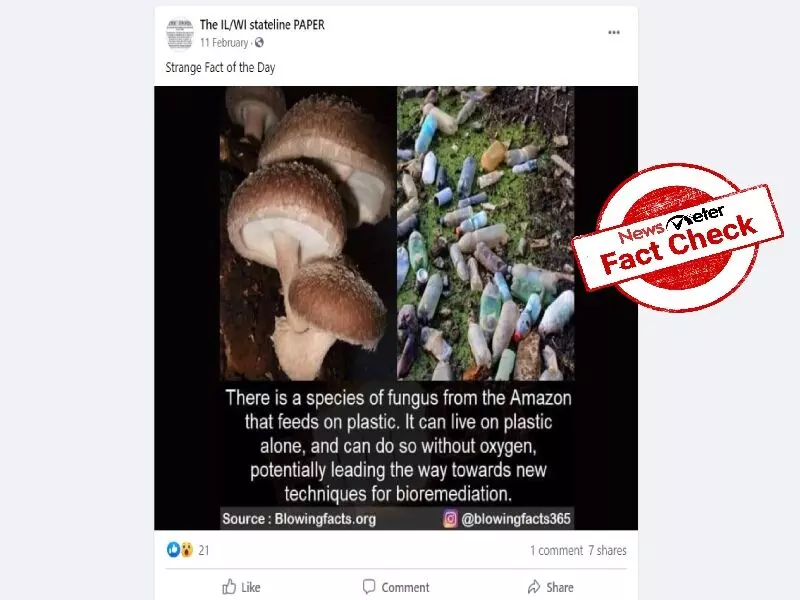Scientists discover fungus that feeds on plastic
Users claim these are species of fungus from the Amazon that feeds on plastic. It can live on plastic alone, and can do so without oxygen, potentially leading the way towards new techniques of bioremediation,
By Satya Priya BN
A collage of mushrooms and plastic bottle waste is viral on social media. Users claim these are species of fungus from the Amazon that feeds on plastic.
"It can live on plastic alone, and can do so without oxygen, potentially leading the way towards new techniques of bioremediation," reads the message
This claim was shared in February 2021 too
Fact check:
The claim is TRUE.
There have been several experiments on few species of fungi that were found capable of degrading plastic without the help of oxygen.
According to an article in Treehugger.com, students on a class research trip from Yale discovered a rare mushroom in the Amazon rainforest in Ecuador back in 2011. The fungus, Pestalotiopsis microspora, can grow on polyurethane, a common polymer in plastic products, and use it as its sole carbon source.
According to the Yale research team, the plain-looking light brown mushrooms can live in environments with or without oxygen, breaking down and digesting polyurethane before turning it into organic matter.
In 2017, a team of scientists discovered another mushroom that eats plastic in a general city waste disposal site in Pakistan. The fungus, called Aspergillus tubingensis, could break down polyester polyurethane into smaller pieces after two months.
We can see the experiment of the Yale students in the video published on Youtube by Tech Insider.
Discovery made in Pakistan could be read in several other articles too.
The research is published in the journal Applied and Environmental Microbiology.
https://journals.asm.org/doi/
An article on interstingengineering.com also talks about the scientific study of 'Mycoremediation - which is an experimental technique that harnesses mushrooms' natural ability to use enzymes to break down foreign substances. This cheap, effective, and environmentally sound technique has been used to decontaminate the environment by getting rid of some contaminants from damaged ecosystems. '
According to a report published in Times of India.com, a group of researchers has found tiny plastic-eating bacteria at Pirana, a solid waster management site in Gujarat. The study discovered 17 classes of bacteria and 9 fungi that eat plastic.
The paper 'Landfill microbiome harbor plastic-degrading genes: A metagenomic study of solid waste dumping site of Gujarat, India' was published in an Elsevier journal.
These Fungi seem to digest the food by secreting enzymes and absorbing the dissolved organic matter back into cells.
https://news.sky.com/story/
Though the research is still on, the claim that few species of Fungi are able to degrade plastic by feeding on them is TRUE.